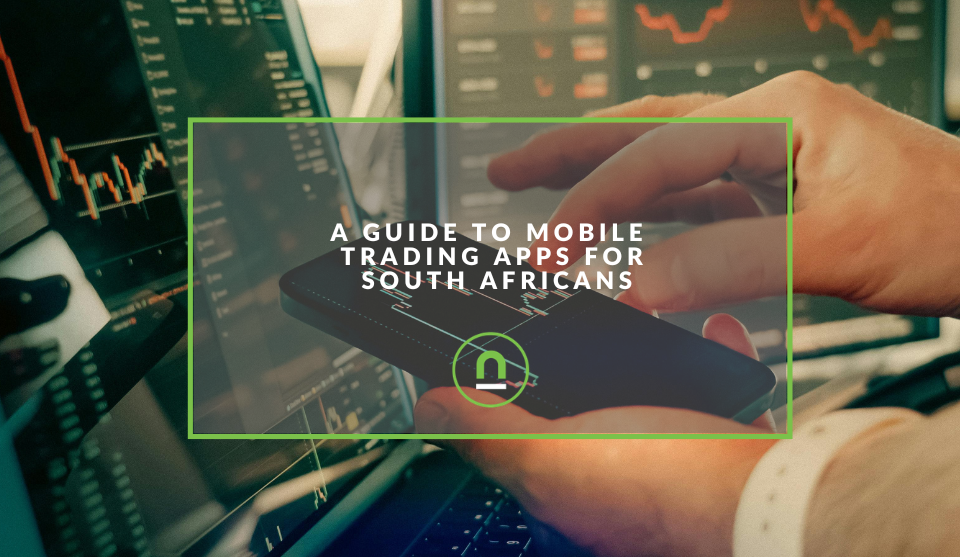Recent posts

Money Talks
A Guide To Mobile Trading Apps for South Africans
19 February 2026

Press Releases
Rehab Your Knee: A Free, Evidence-Based Guide to Smarter Recovery
12 February 2026

Money Talks
XRP vs. Stablecoins: Which Is Better for Cross-Border Payments in 2026?
28 January 2026

Press Releases
Sleep Expert Cautioning Against TikTok’s ‘Mouth Taping’ Trend
28 January 2026
Popular posts
Extravaganza
Trending Music Hashtags To Get Your Posts Noticed
24 August 2018
Geek Chic
How To Fix iPhone/iPad Only Charging In Certain Positions
05 July 2020
Extravaganza
Trending Wedding Hashtags To Get Your Posts Noticed
18 September 2018
Money Talks
How To Find Coupons & Vouchers Online In South Africa
28 March 2019
SA's Financial Frontier: Business Growth Through Trading
23 May 2025 | 0 comments | Posted by Gabriela Pelayes in Money Talks
The terrain of business development in South Africa has entered a transformative phase: increasing internet penetration, smartphone accessibility and the digitization of financial services have assembled fertile ground for online trading. Thus, this elaboration has rendered once-exclusive markets accessible to a more expansive demographic of entrepreneurs and investors.
Online platforms facilitate immediate access to financial instruments such as stocks, indices, commodities and foreign currencies, accommodating enterprises to diversify income streams and manage risk more strategically.
As regulatory frameworks strengthen and digital infrastructure expands, an exponentially increasing selection of South African businesses are embracing trading mechanisms to support growth.
The Rise of Online Trading Platforms
Technology companies and brokerages have responded to demand with innovative platforms tailored to novice traders and sophisticated institutional users.
These instruments offer streamlined interfaces, advanced analytics and real-time data integration, with South African startups and established enterprises leveraging online trading platforms for more than just investment purposes.
These systems double as financial planning resources, providing visibility into global market trends. As a result, decision-makers are integrating market data into daily operations. This metamorphosis is contributing to a knowledge-based economy—one that rewards analytical skill and tech fluency.
Here, the presence of reliable platforms is instrumental in advancing this new financial frontier.
Entrepreneurial Culture Meets Market Liquidity
A defining feature of the South African business environment is its adaptive entrepreneurial culture; from Johannesburg to Cape Town, SMEs and solo entrepreneurs are turning to online markets as secondary income channels or hedging mechanisms against domestic economic volatility.
With access to liquid markets through online trading in South Africa has stimulated businesses to capitalise on opportunities that were once confined to traditional financial institutions.
Trading in equities and currencies provides a relatively low-barrier entry point for capital growth, particularly when compared to infrastructural expansion or supply chain overhauls.
Therefore, such strategies are now viewed as pragmatic responses to currency depreciation and inflationary pressures.
The Role of Forex Trading in Business Growth
Among diverse financial instruments, foreign exchange trading holds particular relevance, with the Forex trading in South Africa has encouraged gaining velocity as entrepreneurs examine means of shielding revenue from rand volatility.
Here, participation in the currency market allows for dynamic responses to macroeconomic shifts, including interest rate changes and geopolitical developments.
Meanwhile, companies with international supply chains or overseas clients are beginning to see Forex trading as a mechanism for risk management.
Currency pair speculation, when backed by research and data analysis—including the use of Forex pivot points for identifying support and resistance levels—can function as a hedge against import cost fluctuations or profit margin erosion.
Thus, financial literacy concerning Forex strategy is quickly becoming a differentiator for forward-looking enterprises.
Education and Capacity Building
The expansion of online trading has sparked demand for financial education across demographic lines—educational institutions, trading academies and online communities are offering workshops and certification programs focused on financial literacy and market analysis.
South African entrepreneurs are increasingly seeking this knowledge to navigate markets with confidence and precision.
Such capacity building boosts the sustainability of online trading adoption: access to verified information, peer-reviewed strategies and analytical instruments are helping traders mitigate impulsive decision-making.
Moreover, structured learning settings are cultivating critical thinking, which in turn contributes to a more mature and resilient trading culture in the country.
Challenges and Risk Awareness
Despite its advantages, online trading is not without inherent challenges. In illustration, market volatility, information asymmetry and psychological factors can result in financial losses.
For businesses incorporating trading into operational strategies, risk management protocols are essential. Here, regulatory compliance, particularly with the Financial Sector Conduct Authority (FSCA), is prominent in safeguarding market integrity.
Moreover, platforms adhering to licensing standards and promote transparent fee structures are increasingly favored. Awareness campaigns and sector oversight are reducing instances of fraud and misuse. This proactive regulatory stance supports long-term trust in digital finance as a viable instrument for economic participation.
Technological Infrastructure and Fintech Partnerships
Investment in South Africa’s digital backbone has accelerated, with fintech firms leading the charge in integrating payment gateways, mobile wallets and blockchain solutions into the trading ecosystem. In this context, strategic partnerships between financial institutions and tech startups have constructed hybrid models that connect banking services with trading capabilities.
These developments make financial services more inclusive, diminishing geographic and socio-economic barriers; businesses in rural areas, once disconnected from global markets, now engage in international trading through mobile applications.
In tandem, innovation in cybersecurity and data protection has also contributed to a safer user experience, reinforcing the credibility of online trading platforms moving forward.
The Function of Analytics and Automation
Data analytics and automation are fundamental in optimizing trading outcomes for South African businesses. Here, algorithmic trading, predictive modeling and AI-driven insights allow for more accurate forecasting and real-time adjustments.
As a result, companies are beginning to integrate automated alerts and decision-support systems into broader financial planning tools.
These innovations diminish manual oversight and accommodate agile responses to market changes; for enterprises managing multiple financial obligations, such capabilities offer a layer of operational efficiency.
Thus, the fusion of automation with strategic intent is empowering South African firms to operate competitively on a global scale.
Shifting Attitudes Toward Investment
Cultural attitudes toward investment in South Africa are shifting from skepticism to engagement. Historical barriers, including limited access to capital markets and a lack of formal education in financial instruments, are being dismantled through exposure and inclusion—encouragingly, younger demographics in particular are showing a propensity for digital investment channels.
This generational shift is influencing how capital is allocated within enterprises. Profits are increasingly reinvested in liquid assets, including diversified trading portfolios.
This signals a more comprehensive philosophical transformation—one where investment and entrepreneurship are no longer viewed as separate pursuits, but as interdependent strategies for prosperity.
Future Outlook and Global Integration
South Africa’s integration into global financial systems continues to deepen. Trade agreements, regulatory harmonization and fintech innovation are positioning the country as a regional hub for digital finance, with online trading serving equally as a symbol and mechanism of this transition.
As the economy diversifies and as businesses seek adaptive strategies for growth, online trading platforms are likely to become core mechanisms in financial planning.
With growing infrastructure, educated participants and sophisticated technology, South Africa is crafting a financial identity that embraces modernity without discarding pragmatism.
Looking to 2030, the convergence of digital finance and entrepreneurship marks a consequential stage, moving toward a more dynamic, inclusive economic future.
Tell us your story.
Would you like to write for a niche market just like Gabriela does? Find out how to submit a guest post, and when you're ready, you can contact us.
Do you need financial help?
Find a financial advisor or financial consultant in your area
Get started with nichemarket
If you are a financial adviser and would like more leads, why not list your business with nichemarket. Registering with nichemarket is easy; all you will need is head over to our sign up form and follow the instructions. If you require a more detailed guide on how to create your profile or your listing, then we highly recommend you check out the following articles.
Recommended reading
If you enjoyed this post and have the time to spend diving deeper down the rabbit hole, then we suggest you check out the following posts about improving your finances in South Africa.
- How South Africans Can Save Money Each Month
- The Pros and Cons Of Tap and Go Cards
- What Is A Money Market Account?
- Ways To Earn Cryptocurrency
- How To Passively Earn Cryptocurrency
- Types Of Cryptocurrency Exchanges
- How South Africans Can Buy Bitcoin
Disclaimer: This is not investment advice and is for informational purposes only. nichemarket cannot be held liable for any investment decisions made based on the information given by independent financial service providers. Under the ECT Act and to the fullest extent possible under the applicable law, nichemarket disclaims all responsibility or liability for any damages whatsoever resulting from the use of this site in any manner.
Tags: Forex, Trading, Investing, Guest Post
You might also like
XRP vs. Stablecoins: Which Is Better for Cross-Border Payments in 2026?
28 January 2026
Posted by Pham Van in Money Talks
XRP or Stablecoins? Discover which wins for cross-border payments in 2026. Compare speed, costs, and stability in our latest global finance guide.
Read moreAfricaworks Accelerates The Rollout Of Real Estate Investment Platform
20 January 2026
Posted by Nicolas Teisserenc in Press Releases
AWIP accelerates the rollout of its urban real estate investment platform in West Africa, raising €4m and fully deploying it into two off-market acqu...
Read more{{comment.sUserName}}
{{comment.iDayLastEdit}} day ago
{{comment.iDayLastEdit}} days ago
 {{blogcategory.sCategoryName}}
{{blogcategory.sCategoryName}}

